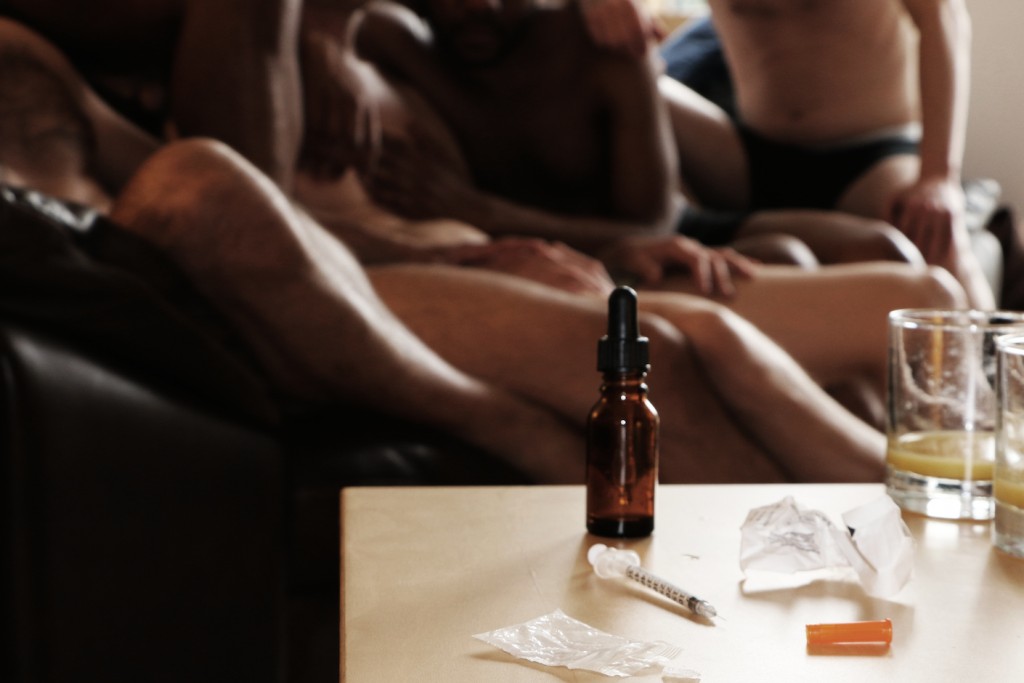Mobeen Azhar: My report into London’s gay chemsex scene

 Ahead of his report on chemsex in London’s gay scene, airing on BBC TV and radio today, journalist and filmmaker Mobeen Azhar (pictured) writes for Attitude…
Ahead of his report on chemsex in London’s gay scene, airing on BBC TV and radio today, journalist and filmmaker Mobeen Azhar (pictured) writes for Attitude…
I’m a part of London’s gay club scene. I know the venues like the back of my hand and I know many of the DJs, promoters and clubbers in them. I’ve noticed in recent years that references to ‘chems’, ‘chillouts’ and ‘g-comas’ have become part of our community’s peripheral vocabulary.
Earlier this year, I set out to investigate the chem scene in London. I wanted to know if it was really ‘ravaging’ the gay scene as some reports have suggested and if there was anything more to chems than the age old story of sex and drugs being a palatable cocktail for some gay men. I was aware that magazines like Attitude and QX had covered the issue but I also knew that in many circles, to question the use of chems was automatically seen as judgmental. There is an assumption in sections of the gay press that chem culture has proliferated in the entire gay scene. That’s not true. It’s a big issue for a small number of people.
Chemsex refers to the use of mephedrone, crystal meth and GHB / GBL (or ‘G’ for short) to facilitate sex. These illegal drugs can increase libido and dramatically decrease inhibition and the desire to sleep. Not all the men on the scene use all the drugs. In fact crystal meth marks a clear line for many of the users I met. Even among meth users there is a kind of hierarchy. Those who simply smoke crystal are seen as holding back whilst those who ‘slam’ (inject) crystal are viewed as the real party animals who have said goodbye to any boundaries.
Early on in my research I was surprised by two significant discoveries. I began making this report wanting to provide a platform for a breadth of chem users to tell their story. I’d read some accounts of chem use in a defiant, almost romantic way, as if to say having group sex on tap, fuelled by meth, ‘G’ and crystal, could signal the ultimate sexual liberation. I actively searched for someone to tell me how they had made an informed and calculated choice to use chems and that for them the chem scene is just recreation. Among the dozens of research interviews I did, I could not find this voice. Even those who told me why sex on chems makes them feel “like a don” would follow up such celebratory statements with tales of rejection, regret, loneliness and a longing for intimacy. These became recurring themes amongst every chem user I spoke to.

The second revelation came from a friend. I’ve known Kiran for about five years and in 2014 he told me he had recently started using crystal meth. This wasn’t a huge surprise to me. I have lots of friends who use drugs recreationally and Kiran’s meth use didn’t really seem to affect him. If it did, he’d hidden it well. He’s the kind of friend I often bump into on dancefloors across London. As I called him to ask him if he knew about chemsex, he opened up about a part of him I was completely unaware of.
Kiran told me he had begun using chems after a break up with his long-term boyfriend.
“He was the first man I’d introduced to my parents as my partner so when he ended it, I felt like I was losing the best relationship I’d ever have. Rather than sit and process the feelings I reactivated one of my online profiles and found two men who invited me over. I got to their place and spent the next two days taking crystal and having sex. It was wild, hardcore sex. In a way I was saying ‘look at me now’ to the man that dumped me. Once you’ve had that kind of sex on drugs, everything else just seems vanilla.”
Kiran ended up being one of the main contributors to the documentary. He describes in detail how under the influence of chems he often took the ‘cheeky’ risk of having condom-less sex. Eventually he was diagnosed as HIV positive. “I felt like I had nothing to lose. I started injecting. When you’re on chems you’re always searching for something more; more men, more extreme experiences, toys, fisting, injecting. I’ve been at parties where men are on their Grindr searching for someone whilst they are having sex. There isn’t any satisfaction.”
Sure, no one knows just how many men have become infected with HIV whilst using chems, but in a study published by the London School of Hygiene and Tropical Medicine, a third of men surveyed described incidents of unintended unprotected sex while under the influence of chemsex drugs. Simultaneously, HIV infection rates are increasing.
Kiran surprised me not just because he’d kept this part of his life hidden but because he had, on the surface at least, maintained such an air of normality. He didn’t fit the stereotype of a drug addict. He wasn’t toothless and living under a bridge. He was witty, intelligent and seemingly in control.

Many men I met would see their chem use as a ‘treat’ they would never speak of in their office, in the taxi they drive or at the law firm they work for. It’s something private that they save for the weekend. But universally they described how they would have unprotected sex when using chems. As Kiran said, “It takes you out of your mind”.
In this vein, there’s nothing unique about chems. Sure, all drugs are about altering a state of consciousness. But chems, when mixed with the instant and anonymous sex-on-tap provided by smart phone apps, offer a particular kind of escape; to a place where sexual health comes second to satisfying a heightened libido. Add to this mix a lack of ability to navigate intimacy and you see why the chem scene isn’t much fun.
Dave Stuart, a therapist from the Dean St clinic, told me they see an average of a hundred new chem users every month. “This is not just about hedonism. It is about intimacy. Gay men often grow up keeping a secret. They grow up being hyper vigilant and not sharing who they really are. That is the direct opposite of intimacy. They come of age into a sexualised gay scene where they try to navigate hook-up apps, normalised drug use and risky sex. They try to incorporate intimacy, but with no frame of reference. Many of the men that come to see us for help with their drug use don’t understand why they are doing what they are doing.”
Understanding these issues will allow a culture of responsibility and authenticity to be nurtured. I recently saw an article in a sexual health publication describing chems as ‘awesome’. I can understand the logic. Suggesting chems are less than awesome could denote judgement and push users away. But there is a ‘down with the kids’ dishonesty here. Chems are not awesome. Their use is indicative of something quiet ugly and distorted. We all have a responsibility to be honest about that. Only then can chem users really get the support they need.
The Report: Chemsex is broadcast on BBC Radio 4 at 20:00 on Thursday 2 July.
A television version is featured on BBC 2 in the UK and BBC Global News globally on the Victoria Derbyshire Show from 09:15 GMT Thursday 2 July, and is available on iplayer.
Mobeen Azhar can be contacted on Twitter via @Mobeen_Azhar.
